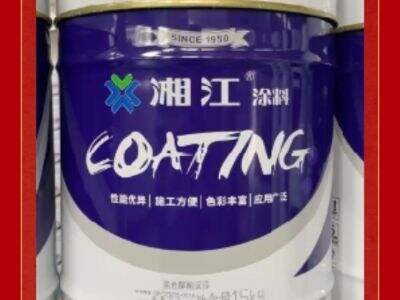Bei Bodenbelägen gibt es verschiedene Arten von Beschichtungen, die verwendet werden können, um den Bodenbelag stabiler und ansprechender zu gestalten. Die Liste solcher Beschichtungen umfasst Epoxy-, Polyurea- und Alkydbeschichtungen. Jeder Typ hat seine eigenen einzigartigen Eigenschaften, die ihn für spezifische Standorte und Anwendungen geeignet machen. In dieser Anleitung werden wir diese Beschichtungen detaillierter untersuchen und helfen zu bestimmen, welche am besten zu Ihren Böden passt.
Epoxy-, Polyurea- und Alkydbeschichtungen erklärt
Bevor wir die Vor- und Nachteile jeder Art von Beschichtung diskutieren, werfen wir zunächst einen Blick darauf, was sie sind und wie sie funktionieren.
Epoxybeschichtungen bestehen aus einer einzigartigen Kombination aus zwei Materialien, einem Harz und einem Hartstoff. Die Kombination dieser beiden Materialien löst eine starke chemische Reaktion aus, die eine zäh und haltbare Oberfläche bildet. Aufgrund dessen sind Epoxybeschichtungen äußerst widerstandsfähig und können erheblichen Verschleiß aushalten.
Polyurea-Beschichtungen sind ebenfalls eine gute Option. Sie sind ziemlich haltbar, aber flexibler als Epoxyd. Dies zeigt ihre Fähigkeit, sich etwas zu biegen, ohne zu rissig zu werden, was sie für Regionen mit extremen Wetterbedingungen wie Regen, Schnee oder Hitze ideal macht.
Alkyd ist eine Art Harz, das zur Herstellung von Alkyd-Beschichtungen verwendet wird. Diese Beschichtungen bieten einen glänzenden, lackartigen Finish, der oft einem ästhetisch ansprechenden Aussehen Ihrer Böden verleiht. Sie sind jedoch möglicherweise nicht so robust oder langanhaltend wie Epoxyd- oder Polyurea-Beschichtungen, wodurch sie besser für Bereiche geeignet sind, die nicht so viel Haltbarkeit benötigen.
Verschiedene Arten von Beschichtungen
Xiangjiang Paint bietet eine große Auswahl an Epoxyd-, Polyurea- und Alkyd-Beschichtungen, um unterschiedliche Anforderungen zu erfüllen.
Beispiele für Optionen, die Sie für Epoxyd-Beschichtungen haben können, sind:
Lösungsmittelbasiert: Diese Beschichtungen sind ideal für Umgebungen mit sehr hohem Verkehrsaufkommen, wie Lagerräume oder Geschäfte, in denen viele Menschen unterwegs sind.
Wasserbasiert: Diese sind am besten für Innenräume geeignet, da sie weniger gefährlich für die Luft sind, die wir atmen, und sie lassen sich leicht reinigen.
100% fest: Dies ist der belastbarste Typ, ein schwarzer Kunststoff, ideal für industrielle und gewerbliche Anwendungen, wo Haltbarkeit von entscheidender Bedeutung ist.
Xiandjiang Paint bietet verschiedene Arten von Polyurea-Koating an:
Reines Polyurea: Es zeigt die Grenzen von Stärke, Chemikalienbeständigkeit und hat die höchste Anwendbarkeit in strengen Umgebungen wie Fabrikböden.
Polyurea-Hybride: Diese kombinieren die Vorteile von Polyurea und anderen Beschichtungsarten, wodurch sie eine vielseitige Option werden, die sich gut in einer Vielzahl von Anwendungen eignet.
Aliphatisches Polyurea: Diese spezielle Art bietet UV-Resistenz vor Sonnenlicht für dauerhafte Farbe und Glanz. Es ist eine wunderbare Wahl für Außenräume.
Eine Reihe von Optionen wird für Alkyd-Beschichtungen angeboten:
Ölbasiert: Diese hinterlassen einen hübschen glänzenden Überzug und sind sehr haltbar, trocknen aber langsamer.
Wasserbasiert — Diese Beschichtungen enthalten geringere Mengen an flüchtigen organischen Verbindungen (VOCs), was bedeutet, dass sie weniger giftig sind und schneller trocknen.
Hybridalkyde: Diese bieten die Haltbarkeit ölbasierter Alkyde mit der Bequemlichkeit einer einfachen Reinigung in wasserbasierten Varianten, was sie gut in vielen unterschiedlichen Umgebungen einsetzbar macht.
Wie effektiv sind diese Beschichtungen?
Wenn wir über die Stärke dieser Beschichtungen sprechen, sind Epoxybeschichtungen die haltbarsten, die schweren Fußeintritt und Druck aushalten können, ohne Schaden zu nehmen. Polyurea-Beschichtungen sind nicht nur extrem stark und flexibel, sondern eignen sich auch gut für Orte mit extremer Wetterbedingungen, um allgemeine Anzeichen von Verschleiß zu bekämpfen. Alkyd-Beschichtungen bieten zwar weniger Haltbarkeit, aber sie können einen schönen glänzenden Finish und etwas Chemikalienbeständigkeit bieten.
Wenn wir überlegen, wie lange diese Beschichtungen halten, müssen wir verstehen, dass 100%-ige Epoxidharzbeschichtungen ohne Zusätze unter geeigneten Bedingungen bis zu 20 Jahren auf Ihrem Boden haften können. Polyurea-Beschichtungen halten ~15 Jahre; Alkyd-Beschichtungen ~10 Jahre. Aber sie halten so lange, je nachdem, wo sie verwendet werden und wie sie im Laufe der Zeit gewartet werden. Die Böden können länger halten, wenn sie sauber gehalten werden und kleine Reparaturen rechtzeitig vorgenommen werden.
Wie verhalten sie sich gegenüber Chemikalien?
Beim Auswahl des besten Produkts für Ihre Bodenbeläge ist es entscheidend, die chemische Beständigkeit dieser Beschichtungen zu berücksichtigen.
Epoxidbeschichtungen weisen eine ausgezeichnete chemische und Fleckbeständigkeit gegenüber vielen Säuren, Ölen und Lösungsmitteln auf. Das bedeutet, dass sie eine gute Wahl für industrielle und kommerzielle Umgebungen sind, in denen Tropfen und Ausläufe häufig vorkommen.
Polyurea-Beschichtungen sind äußerst beständig gegenüber Chemikalien, daher sind sie ideal für strengere Umgebungen, in denen starke Chemikalien vorhanden sind oder eingesetzt werden.
Alkyd-Beschichtungen bieten ein gewisses Maß an Chemikalienbeständigkeit, aber aggressive Chemikalien erfordern möglicherweise eine Epoxy- oder Polyurea-Beschichtung für einen effektiven Schutz.
Welche Beschichtung ist die richtige Wahl für Sie?
Die beste Oberflächenbeschichtung für Ihren Boden hängt von der spezifischen Nutzung ab.
In belebten Umgebungen, wie Fabriken oder Geschäfte, benötigen Sie 100%ige feste Epoxidbeschichtungen. Sie sind außerdem extrem robust und können viel Fußeintritt und Verschüttungen aushalten.
Aliphatisches Polyurea ist eine ausgezeichnete Wahl für Außenbereiche, in denen UV-Strahlen präsent sind, und bleibt farbestabil und glänzend, selbst nach langer Belastung durch Witterungseinflüsse.
Wasserbasis-Alkyd-Beschichtungen waren gefragt für den Einsatz in Innenräumen mit geringem Fußeintritt. Sie sind luftunschädlich, einfach anzuwenden und trocknen schnell, was sie ideal für den Gebrauch zu Hause oder im Büro macht.
Schließlich bietet Xiangjiang Paint eine Vielzahl an Epoxy-, Polyurea- und Alkydbeschichtungen, die für verschiedene Anforderungen und Umgebungen geeignet sind. Beim Auswahl einer Beschichtung müssen Sie auf Aspekte wie Haltbarkeit, Chemikalienbeständigkeit und Lebensdauer Ihrer Beschichtung achten. Durch die Auswahl der richtigen Beschichtung für Ihre Bedürfnisse können Sie sicherstellen, dass Ihre Böden lange Zeit stabil und gut aussehen.
 EN
EN
 AR
AR
 NL
NL
 FR
FR
 DE
DE
 IT
IT
 JA
JA
 KO
KO
 PL
PL
 PT
PT
 RO
RO
 RU
RU
 ES
ES
 TL
TL
 ID
ID
 SR
SR
 SK
SK
 SL
SL
 UK
UK
 VI
VI
 SQ
SQ
 HU
HU
 TH
TH
 TR
TR
 FA
FA
 AF
AF
 MS
MS
 BN
BN
 BS
BS
 KM
KM
 LO
LO
 LA
LA
 MN
MN
 ZU
ZU
 MY
MY
 KK
KK
 UZ
UZ
 KU
KU
 KY
KY

